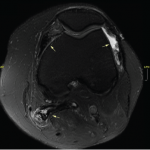Possible Autoimmune Effects
Two autoimmune syndromes are due to an insufficiency of CTLA-4 have been identified, and evidence indicates defective checkpoint biology contributes to the pathogenesis of rheumatoid arthritis (RA). Ex-vivo studies have shown that blockade of PD-1 leads to enhancement and proliferation of memory T cells in RA.2,3
Conflicting data on the function of the PD pathway in rheumatoid arthritis (RA) exist, but a recent paper looking at synovial tissue from RA patients, those with other diseases and controls found a transcriptomic signature associated with the effects of anti-PD-1 therapy.4 “The results suggest the PD-1 pathway is quite similar between active RA and cancer patients treated on anti-PD-1 therapy,” Dr. Calabrese said.
Uncertainty remains about immune-related adverse events (irAEs) associated with checkpoint inhibition. Although they’ve been widely reported on, Dr. Calabrese said it’s not known whether these events represent “true autoimmune diseases—classical forms of autoimmune disease that are being expressed in this challenged population—or do they represent some form of autoimmune-like disease,” he said. Almost all reports of irAEs are based on clinical descriptions, with pathophysiological investigations rare.
We do know irAEs mostly occur within the first 13 weeks, although some can be delayed and not appear until after the drug is discontinued. They can occur alone or in combination, and most are self-limiting with treatment or stoppage of the CPI, although rheumatic irAEs can be ongoing.
Dr. Calabrese emphasized the importance of vigilance for hypophysitis, which has gone from a pre-irAE incidence of one in seven per 9 million to as high as 10–15 per 100 in certain at-risk CTLA-4 recipients.
Recent findings clearly show an overall survival advantage for those experiencing an irAE and those not, indicating an irAE might serve as a biomarker for the anti-tumor response.5
Data had suggested immunosuppressive drugs don’t dampen the likelihood of a response to a checkpoint inhibitor, but recent studies have cast doubt on that finding, including a look at data from two centers that found those on 10 mg or more of prednisone had a less likely chance of responding to a checkpoint inhibitor, after controlling for a variety of variables.6
Going forward, a multidisciplinary approach to treating these patients is needed, Dr. Calabrese said. “We need to work with our oncology colleagues, and we need early referrals,” he said. “We need systems to see these patients. They can’t wait four-and-a-half months for a rheumatology consult.”
Thomas R. Collins is a freelance writer living in South Florida.
References



